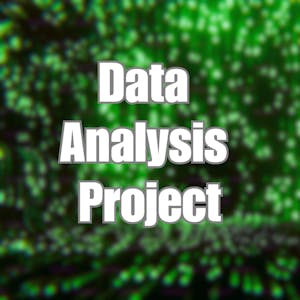The "Data Analysis Project" course equips students with the knowledge and skills to conduct real-life data analysis projects. Through a comprehensive exploration of supervised and unsupervised learning, regression, clustering, dimension reduction, association rules, and outlier detection, participants gain proficiency in applying diverse data analysis techniques to make data-driven decisions.
Throughout the course, students actively engage in tutorials, practical exercises, and a data analysis project case study, gaining hands-on experience to excel in real-world data analysis projects.
Certificate Available ✔
Get Started / More Info
The course modules cover a comprehensive range of data analysis techniques, including supervised and unsupervised learning, regression, clustering, dimension reduction, association rules, and outlier detection, empowering students to apply their knowledge and skills in diverse projects and make data-driven decisions.
The "Data Analysis Overview" module provides a foundational understanding of data analysis, setting the stage for students to embark on a comprehensive exploration of data analysis techniques and methodologies.
The "Classification Analysis" module delves into various classification algorithms, such as Nearest Neighbors, Decision Trees, SVM, Naive Bayes, and Logistic Regression, empowering students to apply these techniques for predictive modeling tasks.
In the "Regression Analysis" module, students gain proficiency in applying regression algorithms, including Simple Linear, Polynomial Linear, and Linear with regularization, to model and predict numerical outcomes.
The "Clustering Analysis" module explores various clustering techniques, such as partitioning, hierarchical, density-based, and grid-based methods, enabling students to discover underlying patterns and structures in data.
Through the "Dimension Reduction" module, students learn to apply Principal Component Analysis (PCA) to simplify high-dimensional data and aid in data visualization.
The "Association Rules" module equips students with the skills to utilize Apriori and FPGrowth algorithms to mine association rules and discover interesting item associations within transactional data.
In the "Outlier Detection" module, students learn various outlier detection methods, including Zscore, IQR, OneClassSVM, Isolation Forest, DBSCAN, and LOF, to identify anomalous data points and contextual outliers.
Google データアナリティクス will equip you with the essential skills to begin a career in the rapidly growing field of data analysis. No prior experience...
Cervical Cancer Risk Prediction Using Machine Learning
This course equips learners with a comprehensive framework for data collection and analysis, encompassing research question design, data curation, analysis planning,...
Preparar os Dados para Exploração é o primeiro passo para adquirir habilidades práticas de análise de dados, explorando viés, credibilidade, bancos de dados...